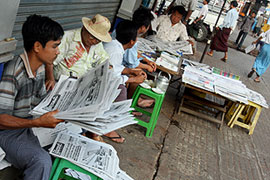US condemns Myanmar poll ‘mockery’
Criticism grows of Myanmar election laws barring Aung San Suu Kyi from standing.

He added: “Our engagement with Burma will have to continue until we can make clear that… the results thus far are not what we had expected and that they’re going to have to do better.
“If Burma is to advance, it is going to have to change its political process, make it more inclusive,” Crowley said.
But he said it “doesn’t appear that Burma is prepared right now to open up its political process”.
‘Farce’
Crowley’s comments add to a raft of international criticism from rights groups and the United Nations over Myanmar’s recently announced election laws.
 |
| The new laws are intended to set the stage for elections expected later this year [AFP] |
On Thursday the Philippines added its voice to the criticism, saying the new laws were a “farce”.
The Philippines and Myanmar are both members of the 10-nation Association of Southeast Asian Nations (Asean), a body that traditionally shies away from criticising the affairs of fellow members.
“Unless they release Aung San Suu Kyi and allow her and her party to participate in elections, it’s a complete farce and therefore contrary to their roadmap to democracy,” Alberto Romulo, the Philippine foreign secretary, told The Associated Press.
On Wednesday the United Nations said it was carefully studying the new laws, adding that they appear not to “measure up to our expectations of what is needed for an inclusive political process”.
A statement from the office of Ban Ki-moon, the UN secretary-general, said: “[Ban] reiterates his call for the Myanmar authorities to ensure an inclusive political process leading to fair, transparent and credible elections in which all citizens of Myanmar, including Daw Aung San Suu Kyi, can freely participate.”
“Daw” is an honorific term used in Myanmar.
Dissolution
|
Myanmar election laws |
|
Myanmar’s military government has announced new laws governing national election expected later this year. The following are key points of the laws announced so far:
|
The new law, detailed in Myanmar’s state-run newspapers on Wednesday, is being seen as an attempt to exclude Aung San Suu Kyi, the country’s jailed opposition leader, and members of her National League for Democracy (NLD) from running for office.
The law will effectively bar over 2,100 political activists and some 429 members of the NLD.
The Political Parties Registration Act also gives the NLD 60 days from Monday, when the law was enacted, to register as a party if it wants to run in the elections, or face dissolution.
On Thursday the military government allowed the NLD to re-open about 100 regional party offices across the country for the first time in almost 7 years.
Cautiously welcoming the move, Nyan Win, a senior NLD spokesman, said the party had yet to decide on whether it will take part in the polls expected in October or November, although an official date has still been not set.
International pressure
The US and the European Union have imposed sanctions on Myanmar due to its refusal to recognise the last elections in 1990 and the prolonged detention of Aung San Suu Kyi.
|
“The new law’s assault on opposition parties is sadly predictable. It continues the sham political process that is aimed at creating the appearance of civilian rule with a military spine” Brad Adams, Human Rights Watch Asia director |
Last November Barack Obama, the US president, raised hopes among Myanmar’s opposition when he brought up Aung San Suu Kyi’s case directly with the military rulers in what was the first meeting between a US president and a Myanmar leader since 1966.
But rights groups have seen the recent announcement of the election laws as a sign that the military has no intention of loosening its grip on the country.
In a statement on Wednesday New York-based Human Rights Watch (HRW) said the passing of the new law showed the ruling military’s “contempt for the democratic process”.
Brad Adams, the group’s Asia director, said the new laws flew in the face of calls for an “inclusive political process” by the people of Myanmar and the international community including its allies in China, India, and Asean.
“The new law’s assault on opposition parties is sadly predictable,” he said.
“It continues the sham political process that is aimed at creating the appearance of civilian rule with a military spine.”
